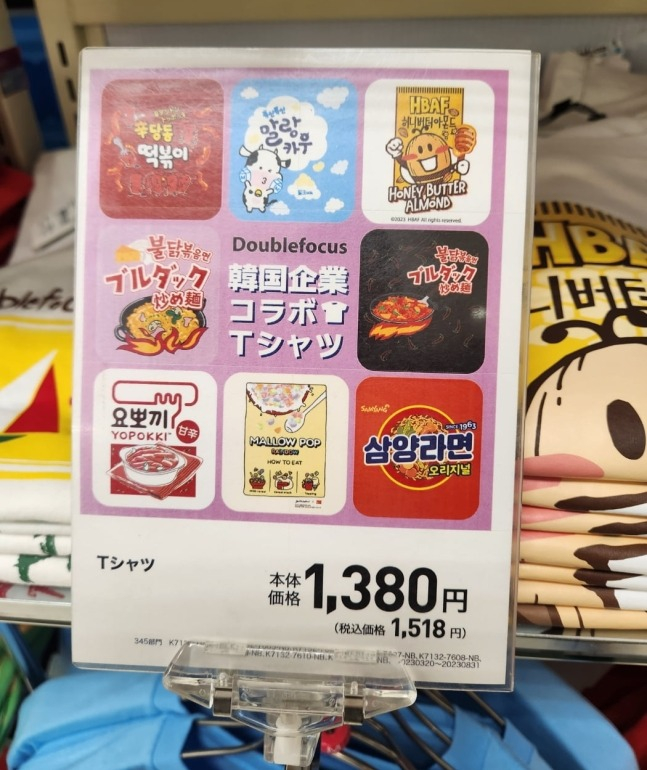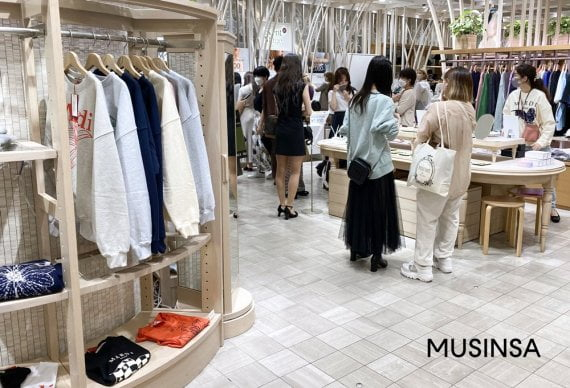Retail
Japan's fever for Korean homegrown brands on the rise
Korean fashion, cosmetics and food are leading the trend; complicated distribution process is a challenge, expert warns
By Aug 31, 2023 (Gmt+09:00)
3
Min read
Most Read
South Korea’s Rznomics inks $1.3 bn out-licensing deal with Eli Lilly


Korea’s aesthetic medicine enjoys golden era with surge in foreign spending


In China’s waterway city Hangzhou, K-beauty redefines ‘shuiguang'


Kumho Tire shuts Gwangju plant after fire, derailing record sales run


When in S. Korea, it’s a ritual: Foreigners make stops at CU, GS25, 7-Eleven



Shimamura Co., Japan’s second-largest apparel company that runs around 2,200 stores nationwide, has dispatched a team of four buyers to Seoul every month since June to find South Korean fashion brands that have potential in the Japanese market.
Japan’s other large companies in the general trading and distribution sectors, such as Mitsubishi Corp., Ito-Yokado Co. and Itochu Corp., are stepping up their efforts to acquire Korean fashion, cosmetics and food brands’ operations in the neighboring country, industry sources say.
“We have recently received an inquiry from a Japanese general trading giant that if we could sell Japanese operations of some firms we own or have a stake in, like Matin Kim and Depound. We were surprised that such a big company has contacted us for Korea’s homegrown fashion brands,” said an official from e-commerce company Hago House on Wednesday.
NEW TREND
“Some Japanese conglomerates have recently started looking for Korea’s hot brands – we see it as a new trend. Previously, Korean brands entered Japan on their own by opening flagship stores in Tokyo,” said Kim Sung-il, chief executive of trading company Jumbo-K.
Kim, who supplies Korean products to Japan, saw 3,000 pairs of slippers with K-pop sensation BTS members’ characters sold out in a Tokyo-based Shimamura store within two days in the summer of 2021. He immediately received an additional order of 30,000 pairs at the time.
Korean products gain more traction on online platforms.
Qoo10 Japan, the third-largest e-commerce platform in Japan following Amazon Japan and Rakuten, sells around 400 Korean cosmetics brands online. “The transactions in Korean beauty products on our platform rose by 3.5 times last year compared with 2019. The first-half revenue from Korean fashion, food and entertainment products increased more than 30% on-year,” a Qoo10 official said.

GROWING SALES
Sales of Korean distilled spirit soju and instant noodles are also on the rise. Korea’s No. 1 soju maker HiteJinro Co. said its soju exports to Japan rose by 22.4% and 27.2% on-year in 2020 and 2021, respectively.
Samyang Foods Co. saw the logo of its hit product Hot Chicken Flavor Ramen's on t-shirts at Aeon Co., one of Japan’s largest retailers. Backed by the growing popularity of instant noodles, the Korean food firm’s Japanese affiliate saw its first-half revenue jump 35.5% on-year to 11.6 billion won ($8.8 million). The revenue in 2022 reached 20.8 billion won, 2.5 times the performance in 2020.
Samsung Electronics Co., which had been the No. 4 smartphone maker in Japan with a market share of 5.2% in 2017, ranked No. 2 last year, doubling its market share to 10.5%, according to research company Strategic Analytics. Korea’s top automaker Hyundai Motor Co. said in July 2022 its all-electric IONIQ 5 crossover to Japan’s taxi service operator MK Group, taking its first step into the Japanese fleet vehicle market.

CHALLENGES
It is not clear yet whether the Korean brands’ popularity in Japan will continue into the long term or not, industry watchers say.
Some Korean fashion brands and platforms are yet to see meaningful achievements in Japan. Online fashion platform Musinsa, athleisure brand Xexymix, casual clothing company Thisisneverthat and streetwear brand Nerdy entered Japan in recent years but their businesses are still struggling there.
“It is hard for foreign businesses to put down roots in Japan if they don’t understand the complicated distribution structure, where importers, second vendors, first vendors and distributors are connected to sell a product. But most Korean brands which seek to run businesses in Japan prefer to directly enter the market on their own,” said Jumbo-K CEO Kim.
Write to Dong-Hui Park at donghuip@hankyung.com
Jihyun Kim edited this article.
More to Read
-
 Food & BeverageSamyang’s Hot Chicken Flavor Ramen sales exceed 5 bn
Food & BeverageSamyang’s Hot Chicken Flavor Ramen sales exceed 5 bnJul 28, 2023 (Gmt+09:00)
1 Min read -

-
 Travel & LeisureJapan sends most tourists to S.Korea in May: tourism body
Travel & LeisureJapan sends most tourists to S.Korea in May: tourism bodyJun 29, 2023 (Gmt+09:00)
1 Min read -
 AutomobilesHyundai Mobis overtakes Japan's Aisin on global auto parts market
AutomobilesHyundai Mobis overtakes Japan's Aisin on global auto parts marketJun 27, 2023 (Gmt+09:00)
1 Min read -
 Beauty & CosmeticsKorean cosmetics maker Able C&C rejuvenated by sales in Japan, US
Beauty & CosmeticsKorean cosmetics maker Able C&C rejuvenated by sales in Japan, USJun 20, 2023 (Gmt+09:00)
3 Min read
Comment 0
LOG IN


